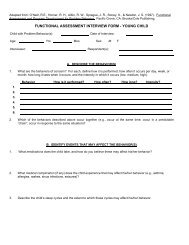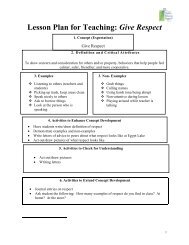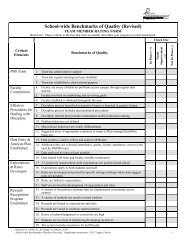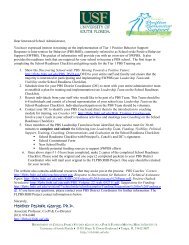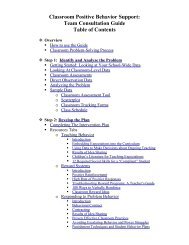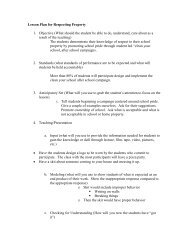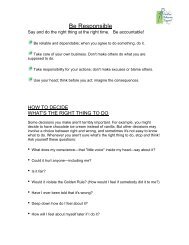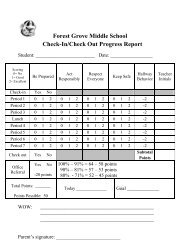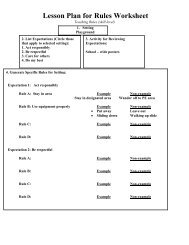Georgia PBS Interventions - Florida's Positive Behavior Support ...
Georgia PBS Interventions - Florida's Positive Behavior Support ...
Georgia PBS Interventions - Florida's Positive Behavior Support ...
- No tags were found...
You also want an ePaper? Increase the reach of your titles
YUMPU automatically turns print PDFs into web optimized ePapers that Google loves.
Walk through the cereal aisle at the store and do the following:· Pick up a box of cereal that has a toy in that you want· Walk over to your child and say, “I’d really like to have this cereal this week because it has a CD gameof Monopoly in the box.”· I promise I will eat this cereal even if it tastes horrible, because I want the game.Tell your child ahead of time to tell you “No” to whatever you ask for.· When your child tells you “no,” ask him or her for a reason.· Accept his or her reason and put the cereal on the shelf.Then have your child do the same thing back to you· Have him or her choose a box of cereal that has a toy in it wants· Have him or her tell you they would like the cereal because of the toy· Have him or her promise he or she will eat the cereal no matter whatTell him or her no· Have him or her ask you for a reason and then give one· When they accept your reason praise him or her for following directions· Practice this several times and then practice it several more time during subsequent trips to variousstores with various items.On the same days that you practice saying “no,” also practice saying “yes.” Have him or her modelsaying “thank you” and then compliment him or her on his or her manners. You will need to model thisthe same way you did for the “no” model.It isn’t a miracle, and it isn’t going to happen over night. But soon, you will start to see a differencewhen you tell your child “no.” It is fair for him or her to understand why you said, “no,” so explainingyour reason is reasonable. Your children will respect you for not using the “I’m the mommy that’s why,”and you will respect him or her for using good manners by accepting your reason. Be honest in yourreason. “It’s too expensive.” “It’s not good for you.” “I don’t have the money this week,” are all goodresponses.The most important lesson is to practice, practice, and practice the new behavior. You have to beconsistent. If you say “no” and give a reason, then don’t give in and purchase the item if furtherbegging ensues. This only tells the child that you have a breaking point and to keep trying. If you’vesaid “no” and given a reason, then you should not say “no” again nor give another reason. When yourchild accepts your answer and your reason, then it is very important for you to compliment him or heron this good behavior. It is also very important that both parents and/or caregivers are consistent.<strong>Positive</strong> <strong>Interventions</strong> and Effective Strategies Riffel -© 2005 - 69 -




